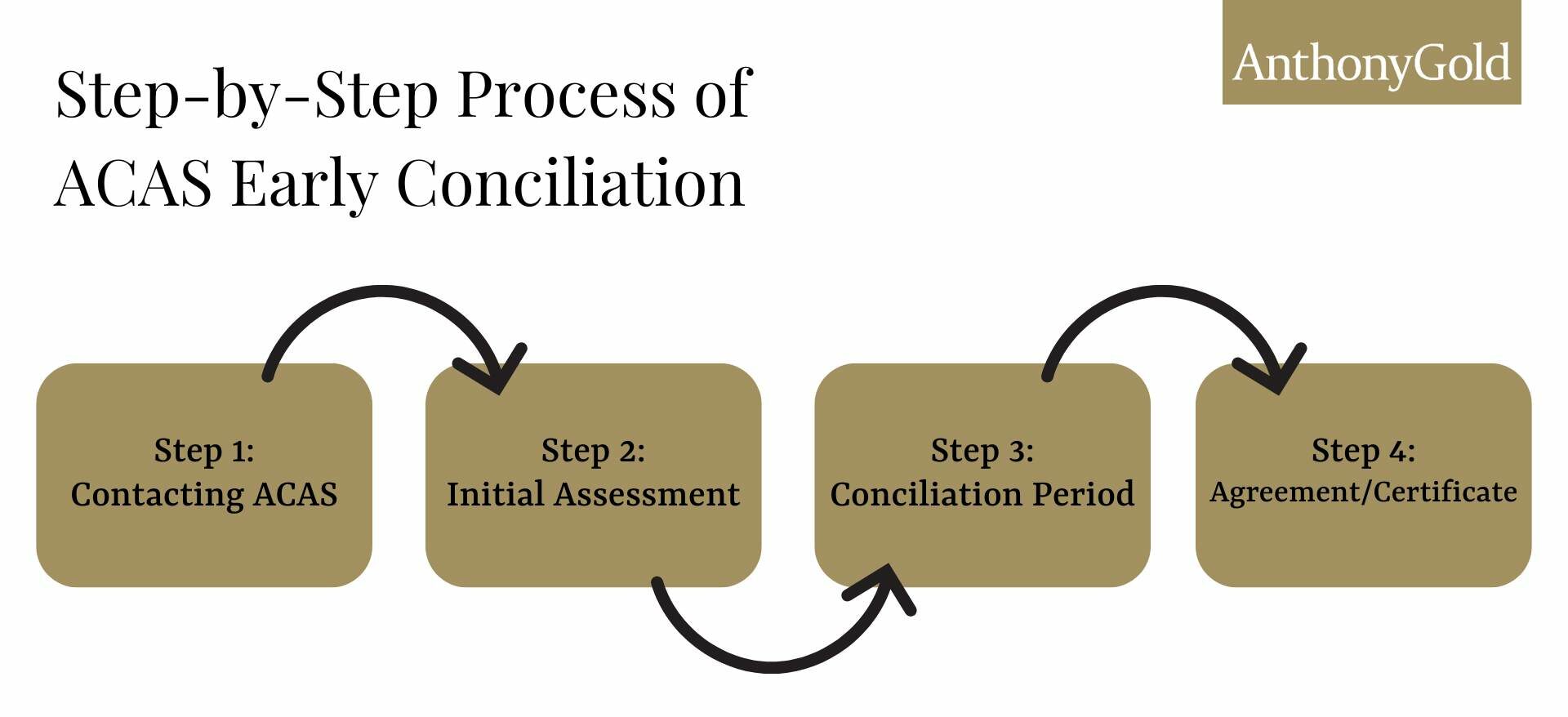Benefits of ACAS Early Conciliation for resolving workplace disputes


Resolving employment disputes at an early stage enables both employees and employers to have control over the outcome and to avoid the stress, time, and costs of employment tribunals. If the matter cannot be settled before the strict time limits for bringing claims, it is essential for a claimant to make an ACAS Early Conciliation notification within the time limit. A claimant cannot make an employment tribunal claim unless they first obtain a certificate from ACAS giving the dates of the start and end of the early conciliation period.
There are then strict time limits in which a claimant must make their employment tribunal claim, even after receipt of that Certificate.
This blog aims to inform clients about the early conciliation process, its benefits, and how Anthony Gold can assist in navigating it effectively. By understanding ACAS Early Conciliation, both parties can achieve amicable solutions without resorting to formal litigation.
Skip to the relevant section:
- What is ACAS Early Conciliation?
- What are the benefits of Early Conciliation?
- The Early Conciliation Process: Step-by-Step Guide
- How can you prepare for Early Conciliation?
- What Common Issues are Addressed in Early Conciliation?
What is ACAS Early Conciliation?
ACAS Early Conciliation is a free and confidential service offered by the Advisory, Conciliation and Arbitration Service (ACAS). It aims to help resolve workplace disputes without the need for an employment tribunal.
Since May 2014, it has been a legal requirement in the UK to first notify ACAS and consider early conciliation before making employment tribunal claims. There have been some changes to early conciliation since 2020, but the overarching obligation remains unchanged.
This mandatory step is designed to encourage the resolution of disputes through negotiation rather than litigation, helping to reduce the burden on the tribunal system and the associated costs and stress for both parties.
The early conciliation process involves a series of steps aimed at facilitating an agreement between the disputing parties:
- Notification: The claimant must notify ACAS of their intention to make a claim and this is usually done online.
- Initial Contact: An ACAS conciliator will contact the claimant to gather information and explain the process in more detail.
- Conciliation Period: The conciliator will attempt to facilitate discussions and negotiations between the parties to reach a settlement – the overall period is 6 weeks from the point of notification.
- Outcome: If a settlement is reached, it is formalised in a legally binding agreement known as a COT3. If not, the claimant receives an early conciliation certificate, allowing them to proceed with their tribunal claim.
What are the benefits of Early Conciliation?
- Cost-Effectiveness: Early conciliation can be significantly cheaper than going to an employment tribunal. It eliminates the need for costly legal fees and the financial burden of tribunal proceedings.
- Time-Saving: Resolving disputes through early conciliation is generally much quicker than the tribunal process, which can take upwards of 12 to 24 months.
- Reduced Stress: The conciliation process is less formal and adversarial than a tribunal, reducing the emotional and psychological stress for both parties.
The Early Conciliation Process: Step-by-Step Guide

- Step 1: Contacting ACAS:
The process begins when the claimant submits an Early Conciliation Notification Form to ACAS. This can be done online or by phone. Once the form is submitted, an ACAS conciliator will contact the claimant to discuss the case and explain the next steps. - Step 2: Initial Assessment:
During the initial contact, the ACAS conciliator will gather information about the dispute and assess whether early conciliation is appropriate. They will also explain the process and what the parties can expect. - Step 3: Conciliation Period:
The conciliator will then reach out to the employer to see if they are willing to engage in the conciliation process. If both parties agree, the conciliator will facilitate discussions, helping them explore options for settlement. This period can last up to six weeks from the notification date, but most cases are resolved more quickly. - Step 4: Agreement or Certificate:
If an agreement is reached, it is formalised in a legally binding settlement agreement. If no agreement is reached, the conciliator will issue an Early Conciliation Certificate to the claimant, allowing them to proceed with an employment tribunal claim if they wish.
Roles and Responsibilities:
- ACAS Conciliator:
The conciliator acts as a neutral third party, facilitating discussions and helping both sides explore potential solutions. They do not take sides or impose decisions. - Employee and Employer:
Both parties are responsible for engaging in the process in good faith, being open to negotiation, and considering the options presented by the conciliator.
By understanding the early conciliation process and preparing effectively, both employees and employers can maximise their chances of resolving disputes amicably and avoiding the stress and costs associated with tribunal claims.
How can you prepare for Early Conciliation?
When completing the online ACAS Early Conciliation notification, you are invited to give details of your claim/dispute. Although it is not essential to complete this it may be useful to do so.
Documentation and Evidence:
- Collecting Evidence: Gather all relevant documentation, such as employment contracts, emails, performance reviews, and any correspondence related to the dispute. This evidence will support your position and provide a clear picture of the issue at hand.
- Organising Information: Ensure all documents are well-organised and easily accessible. This preparation will help you present a coherent and compelling case during the conciliation process.
Legal Advice:
Before entering into early conciliation, you should seek advice on your rights and your best negotiation points and, crucially on time limits. If you are a member of a trade union, they will be well placed to help you. You may need legal advice from a solicitor. At Anthony Gold, our experienced employment law team can guide you through the process, helping you prepare your case and negotiate effectively and can even negotiate on your behalf if you would like.
Communication Strategy:
- Effective Communication: Be clear and concise in your communication. Focus on the key issues and desired outcomes. Avoid emotional language and stay professional.
- Negotiation Tips: Be open to compromise and consider the other party’s perspective. Effective negotiation often involves finding a middle ground that satisfies both parties.
What Common Issues are Addressed in Early Conciliation?
What are the types of disputes?
These are some examples of cases that come up often in ACAS Early Conciliation and which can often be, reasonably, settled by the parties:
- Unfair Dismissal: Early conciliation is often used to resolve claims of unfair dismissal. Employees can negotiate for compensation or reinstatement without the need for a tribunal.
- Discrimination: Cases involving discrimination based on age, gender, race, disability, or other protected characteristics can be effectively addressed through early conciliation.
- Wage Disputes: Disputes over unpaid wages, holiday pay, or unlawful deductions are common issues that can be settled through conciliation.
- Contractual Disputes: Breaches of employment contracts, such as changes in terms and conditions without consent, can be resolved with the help of an ACAS conciliator.
Conclusion
ACAS Early Conciliation is a crucial step in resolving employment disputes efficiently and amicably. It offers numerous benefits, including cost-effectiveness, time-saving, and reduced stress, making it an attractive alternative to employment tribunals. It is also an essential first step if you think you may need to lodge a tribunal claim.
Anthony Gold has a team of experienced employment law specialists who understand the intricacies of early conciliation and employment tribunals.
For further guidance and support, contact our employment team for expert legal advice and support.
Please note
The information on the Anthony Gold website is for general information only and reflects the position at the date of publication. It does not constitute legal advice and should not be treated as such. It is provided without any representations or warranties, expressed or implied.


Our Latest Employment Law Insights
- November 22, 2025
Paternity leaves in the UK: What fathers & employers need to know (2025 update)
- November 22, 2025
How our Employment & Trade Union team can assist with disputes & settlement agreements
- November 22, 2025
Settlement Agreements explained | Aneil Balgobin, Head of Employment Law at Anthony Gold Solicitors
- November 22, 2025
Constructive dismissal explained by UK employment law expert
- June 23, 2025
Neurodiversity and Reasonable Adjustments: What UK Employers Must Know in 2025
- June 20, 2025
Fire and Rehire: What’s Still Allowed Under the New Law?
Latest Articles
View allInsights: January 15, 2026
Guides: January 5, 2026
Contact the Conveyancing team today
Contact us today
"*" indicates required fields
Contact the commercial
& civil Dispute team today
"*" indicates required fields
Contact the Conveyancing team today
Contact the Conveyancing team today
Contact the Wills, Trusts
& Estates team today
Contact the Court of
Protection team today
Contact the Employment Law team today
Contact the Clinical Negligence team today
Contact the Family & Relationships team today
Contact the Personal Injury Claims team today
Contact the leasehold & Freehold team today
Contact the Corporate & Commercial team today
Contact the housing & disputes team
"*" indicates required fields
























